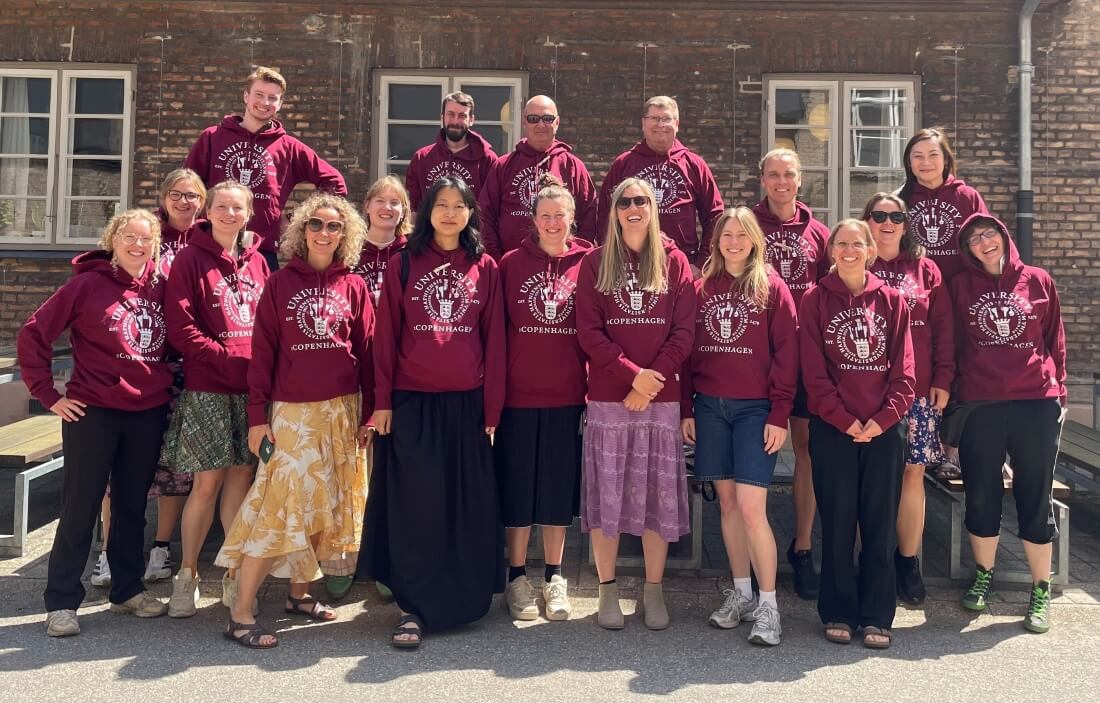- IVH - UK
- Research at IVH
- Bacteria and Viruses
- Veterinary and Zoonoti...
Veterinary and Zoonotic Virology (VEZ-VIR)
We are a research group dedicated to understanding viral dynamics in animals, with the overall aim of improving animal health and contributing to a One Health approach in tackling zoonotic viral infections. Our work focuses on veterinary and zoonotic viral diseases in production animals, with particular expertise in influenza A virus in birds and pigs.
We also run projects on viral diseases in wildlife and companion animals. We study viruses from the molecular level to their impact on animal health in the field, to better understand their epidemiology, pathogenesis, and control.
Furthermore, we provide diagnostic assays for a range of viral pathogens. In addition to research, we are actively involved in teaching in the field of animal viral diseases.
We seek to enhance understanding of virus biology spanning from the molecular level to the disease caused in the animal. We have extensive experience in studying animal viruses and continue to use this knowledge to develop improved control measures for the diseases including vaccines.
Projekt: Kontrol og forebyggelse af virusinfektioner i danske grise
Bevillingsgiver: Svineafgiftsfonden
Bevillingsår: 1.1.2026-31.12.2026. Tilskud: 1.003.000 DKK
Projekt: Varigheden af beskyttelsen efter vaccination mod fugleinfluenza og Newcastle disease virus
Bevillingsgiver: Fjerkræafgiftsfonden
Bevillingsår: 2025. Tilskud: 454.000 DKK
Projekt: Redskaber til kontrol af virusinfektioner i danske kalve II
Formål: At undersøge smittedynamikken og den kliniske betydning af Influenza D virus i danske kalve.
Sponsor: Kvægafgiftsfonden 1.1.2025-31.12.2025. 452.000. Kr.
Redskaber til kontrol af virusinfektioner i danske kalve
Samarbejde: Tobias Volhøj, Dyrlæge og Ko
Formål: At undersøge smittedynamikken og den kliniske betydning af Influenza D virus i danske kalve.
Sponsor: Kvægafgiftsfonden 1.1.2024-31.12.2024. kr. 749.000.
Redskaber til kontrol af virusinfektioner i danske svin II
Fra 2022 har SEGES Innovation udvidet aktiviteterne vedr. reduktion af PRRSV med henblik på at opnå en større andel af PRRSV-fri besætninger, hvor KU bidrager med virologisk ekspertviden og avanceret laboratorieanalyser.
Sponsor: Svineafgiftsfonden 1.1.2025-31.12.2025. 1.417.000. Kr
Redskaber til kontrol af virusinfektioner i danske svin
SEGES Innovation har/har planlagt at indsamle prøver i 2-3 besætninger med henblik på at undersøge effekten af en række management tiltag på reduktion af smittetrykket i farestalden. KU gennemfører de tilknyttede virusundersøgelser.
Sponsor: Svineafgiftsfonden, 1.1.2024-31.12.2024
Avian influenza: Vaccination and molecular biological characterization
The aim of the project is to make research on the efficacy and application of vaccines against highly pathogenic avian influenza viruses (HPAIV). Furthermore, based on viruses sequenced in relation to the passive and active surveillance program for HPAIV in Denmark, detailed phylogenetic analyses will be performed. Furthermore, the project participants will assist in the evaluation of outbreaks in poultry and mammals
Grant: Veterinary contingency program. 2024-25. 4.8 million DKK.
Surveillance of Influenza A virus in Danish pigs
FluZooMark: Viral and Host Factors of Zoonotic and Pandemic Influenza A Viruses
Researchers in virology and immunology in animals and humans will work together to characterize human and animal influenza viruses to find out why some influenza viruses can transmit from swine to humans. The project is expected to generate groundbreaking new tools for preventing future influenza pandemics in humans and provide knowledge that can be used in the future to design improved vaccines for humans and animals.
Funding: Novo Nordisk Foundation Challenge program 2019. 60 mill. DKK.
ARBO-WATCH
An arbopathogen preparedness network to identify and track emerging vector-borne pathogens in a time of climate change
Climate change- through warmer temperatures, altered rainfall patterns, and increased anthropogenic disturbance of natural habitats -is driving large-scale shifts in animal behaviour, ecology, and dispersal. Arthropods are moving or expanding their ecological ranges, and microbial equilibria are being disrupted, leading to changes in pathogen distribution and transmission dynamics. Arthropod-borne pathogenic microorganisms (arbopathogens) are spilling over into previously unaffected territories, including areas at higher latitudes and elevations, and their geographic ranges are expected to continue expanding.
Our network focuses on identifying and monitoring novel or unexpected vector-borne pathogens before they become health threats. We coordinate this project in collaboration with the Globe Institute, the University of Milan, the University of Warsaw, and the University of Naples.
Funding: European Union, 4EU+, SEED-4EU, €50,000
WiPP – Wildlife Parvovirus Patrol
Parvoviruses are among the smallest known viruses, yet they possess significant pathogenic and emergence potential. These viruses are found across the entire animal kingdom—in vertebrates and invertebrates, on land and in marine environments. We apply epidemiogenetics, parvogenomics, and phylogenetic modelling to study the ecology and evolution of parvoviruses in wildlife, with a particular focus on carnivorans.
Our primary interests include elucidating cross-species transmission dynamics and assessing the impact of human-associated viruses (such as canine parvovirus 2 and Aleutian mink disease virus) - on wildlife populations. This work is conducted in close collaboration with the Section of Parasitology and Pathobiology, the Globe Institute, and several international partners.
The Biology of Insect-borne Flaviviruses.
These RNA viruses (e.g. West Nile virus) can replicate in insect, avian and mammalian hosts. Infections by these flaviviruses can cause disease and mortality in birds and in a range of different “dead-end” mammalian hosts including horses. Such viruses are spreading across Europe. Currently, there is limited understanding of the basis of host specificity for these viruses, and a lack of tools to follow the adaptation of the virus. In addition, current serological assays for these viruses are hampered by cross-reactivities between them. This project, in close collaboration with SSI, will seek to address some of these issues.
Funding: FVST from the Research Reserve Initiative. 2024-27. ca. 3 mill. DKK
EU Partnership for Animal Health and Welfare (EUP AH&W)- Joint Internal Project OO3-Action 1.
Basic knowledge on priority pathogens and infectious diseases. The aim is to gain basic knowledge on priority swine pathogens, specifically for us on African swine fever virus. We are performing analyses of gene expression in ASFV-infected cells.
Funding: 220.000 Euros. 2024-25.
- In a recent study we found large differences in the viral dynamics, pathogenesis and viral shedding in pigs infected with human and swine adapted influenza A viruses. https://doi.org/10.1371/journal.ppat.1011838
- In another study we characterized the pathological and virological findings in seals infected with HPAI viruses. https://doi.org/10.1111/irv.13208
- We also recently identified the release of high levels of cellular DNA into the blood of ASFV-infected pigs, presumably reflecting large amounts of cell death caused by the virus. https://doi.org/10.3390/v15102133
- Ryt-Hansen P, George S, Hjulsager CK, Trebbien R, Krog JS, Ciucani MM, Langerhuus SN, DeBeauchamp J, Crumpton JC, Hibler T, Webby RJ & Larsen LE. Rapid surge of reassortant A(H1N1) influenza viruses in Danish swine and their zoonotic potential. 2025. https://www.tandfonline.com/doi/full/10.1080/22221751.2025.2466686
- Liang Y, Boklund AE, Larsen LE, Breum S, Giese S, Hammer AS, Kirkeby CT, Krog JS, Liu Y, Madsen JJ, Therkildsen OR, Ovesen MT, Quaade ML, Trebbien R, Mortensen S & Hjulsager CK Epidemiological and Virological investigation of high pathogenicity avian influenza outbreaks in Danish poultry during 2020/2021 and 2021/2022. 2025. https://pubmed.ncbi.nlm.nih.gov/40147156/
- Canuti M, Mira F, Villanúa D, Rodríguez-Pastor R, Guercio A, Urra F & Millán J Molecular ecology of novel amdoparvoviruses and old protoparvoviruses in Spanish wild carnivorans. 2025. https://pubmed.ncbi.nlm.nih.gov/39809349/
Group/project members
| Name | Title | Phone | |
|---|---|---|---|
| Andersen, Kirsten Lise | Research Consultant | +4535336331 | |
| Bentsen, Yuan Liang | Postdoc | +4535337865 | |
| Canuti, Marta | Assistant Professor | +4535327683 | |
| Goecke, Nicole Bakkegård | Assistant Professor | +4535327222 | |
| Grønnegaard, Nina Dam | Laboratory Technician | +4535328312 | |
| Karlsson, Louise Fredsbo | Research Consultant | +4535332480 | |
| Kristensen, Charlotte | Postdoc | +4535325008 | |
| Larsen, Lars Erik | Professor | +4535332329 | |
| Martiny, Karen | Postdoc | +4535322266 | |
| Normann, Preben | Laboratory Technician | +4535330117 | |
| Petric, Philipp Peter | Postdoc | +4535331118 | |
| Romar, Mathias | PhD Fellow | +4535333553 | |
| Ryt-Hansen, Pia | Assistant Professor - Tenure Track | +4535334530 | |
| Torp, Charlotte | Research Assistant | ||
| Tran, Hue Thi Thanh | Laboratory Technician | +4535322549 |
Other group members
| Name | Title | |
|---|---|---|
| Sophie George | Assistant |
Contact
 Research Group Leader
Research Group Leader
Lars Erik Larsen, Professor
Phone +45 3533 2329
Mail: lael@sund.ku.dk
The Veterinary and Zoonotic Virology group
Department of Veterinary and Animal Sciences
Dyrlægevej 88, building 1-09
Frederiksberg Campus
DK-1870 Frederiksberg C
University of Copenhagen
Grønnegårdsvej 15, 1870 Frederiksberg C

